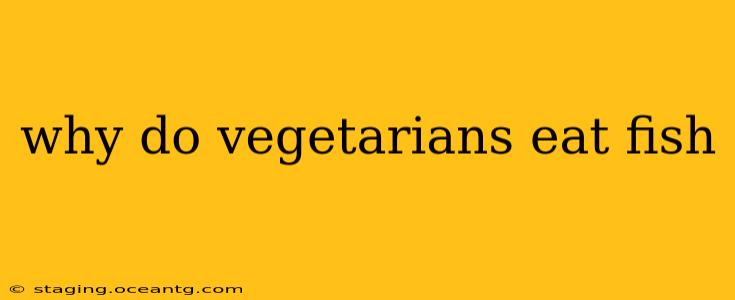Why Do Vegetarians Eat Fish? The Curious Case of the Pescatarian
The question "Why do vegetarians eat fish?" highlights a common misconception. Vegetarians, by definition, abstain from eating meat. However, the term "vegetarian" encompasses a broad spectrum of dietary choices, and some individuals who identify as vegetarian do eat fish. This group is more accurately described as pescatarian.
It's important to distinguish between these dietary styles:
-
Vegetarian: Excludes all animal flesh (including meat, poultry, and seafood). This can further be subdivided into various types (lacto-ovo vegetarians who consume dairy and eggs, vegans who exclude all animal products, etc.).
-
Pescatarian: Includes fish and seafood in their diet but excludes other meats.
So, the short answer is: Vegetarians don't eat fish; pescatarians do.
Why Choose a Pescatarian Diet?
Many people choose a pescatarian diet for various reasons, often overlapping:
1. Health Benefits: Fish is a rich source of omega-3 fatty acids, crucial for brain health, heart function, and reducing inflammation. These benefits are often cited as a primary reason for including fish in the diet while still limiting red meat and poultry consumption.
2. Environmental Concerns: Compared to land-based animal agriculture, sustainable fishing practices can have a smaller environmental footprint. Some pescatarians believe that consuming fish aligns better with their environmental values than eating other meats. This is a nuanced point, as overfishing and unsustainable fishing practices are major environmental concerns.
3. Taste and Preference: Simply put, many people enjoy the taste and texture of fish. It provides a variety of culinary options and can easily be incorporated into a healthy diet.
4. Cultural and Traditional Influences: In many cultures, seafood is a staple food, and incorporating it into a modified vegetarian diet is a natural transition.
5. Gradual Shift Towards Vegetarianism: Some individuals transition to a pescatarian diet as a stepping stone towards vegetarianism or veganism. It allows for a gradual reduction in meat consumption while still enjoying the health benefits of fish.
What are the Differences Between Pescatarian and Vegetarian Diets?
The key difference lies in the inclusion of fish and seafood. A vegetarian diet strictly excludes all animal flesh, while a pescatarian diet includes fish and other seafood but excludes other meats. This difference impacts the nutritional profile and the ethical and environmental considerations involved.
Is a Pescatarian Diet Healthy?
A well-planned pescatarian diet can be highly nutritious and beneficial for health. However, it's crucial to focus on consuming a variety of fish and other healthy foods to ensure adequate nutrient intake. Over-reliance on certain types of fish can lead to mercury exposure, so moderation and diversity are important.
Are Pescatarians Considered Vegetarians?
No, pescatarians are not considered vegetarians in the strictest sense. While some may identify as vegetarian due to the exclusion of land-based meats, the inclusion of fish clearly distinguishes them from strict vegetarians. The term "pescatarian" accurately reflects their dietary choices.
By understanding the distinctions between vegetarian and pescatarian diets, we can appreciate the diverse motivations and choices individuals make regarding their food intake. Ultimately, the most important aspect is choosing a diet that is healthy, sustainable, and aligns with one's personal values and preferences.
